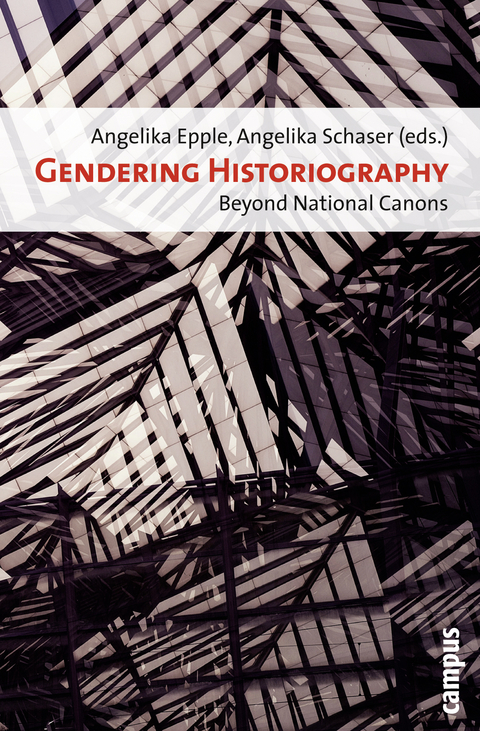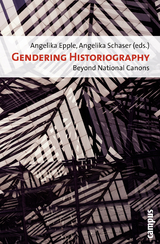Gendering Historiography
Comparing various European and American historiographies from the past two hundred years, Gendering Historiography provides insights into the establishment and cultivation of gendered power relations in different societies and outlines the devastating effects that exclusionary practices can have on each national canon. This detailed and revealing book will change the face of history writing, bringing overlooked and previously excluded histories back into modern historiography.Geschichtsschreibung ist keine geschlechtsneutrale Angelegenheit. Renommierte europäische und amerikanische Historikerinnen gehen hier der Geschichte, Gegenwart und Zukunft ihres Fachs aus geschlechterhistorischer Perspektive nach. Sie zeigen, welche Faktoren und Entwicklungen die Geschichtswissenschaft bis heute prägen.
Angelika Epple ist Professorin für Allgemeine Geschichte unter besonderer Berücksichtigung des 19. und 20. Jahrhunderts an der Universität Bielefeld. 2023 wurde sie Rektorin der Universität Bielefeld.
Angelika Schaser ist emeritierte Professorin für Neuere Geschichte an der Universität Hamburg.
Contents
Multiple Histories? Changing Perspectives on Modern Historiography
Angelika Epple and Angelika Schaser
1. Historiography in flux
Gendering Historiography in the Global Age: A U.S. Perspective
Bonnie G. Smith
Fear of Plurality: Historical Culture and Historiographical Canonization in Western Europe
Maria Grever
2. Gendering the National Canons of Historiography
Biography, Gender and the Deconstruction of a National Canon
Irma Sulkunen
Gendering the Polish Historiography of the late Eighteenth and Nineteenth Centuries
Claudia Kraft
3. Dividing Lines between the Traditional Canon and Excluded Histories
Gendering Tradition and Rewriting Church History
Ulrike Gleixner
Gossip or History? Popular Turkish Historians and the Writing of Ottoman Women's History
Ruth Barzilai-Lumbroso
"There is so much, and it will all be history": Feminist Activists as Historians, the Case of British Suffrage Historiography, 1908-2007
Krista Cowman
Opening up Narrow Boundaries: Memory Culture, Historiography and Excluded Histories from a Gendered Perspective
Sylvia Paletschek
4. The Gender-coded Profession of the Historian and Alternative Professional Careers
History as Argument - Alexandra Gripenberg, Ellen Key and the Notion of True Feminism
Tiina Kinnunen
Tapping New Resources - Setting Old Boundaries: Female and Male Historians under National Socialism
Heike Anke Berger
Gendering Historiography? Problems and Suggestions
Martina Kessel
Contributors
Index
"Insgesamt lässt sich der sehr gut strukturierte und lektorierte Sammelband als gelungener Schritt in Richtung auf eine transnationale Historiographieforschung werten, der neben interessanten Einzelergebnissen und -aspekten vor allem auch eine Vielzahl von offenen Fragen ausweist, die der Historiographieforschung neue Wege weisen kann." (H-SOZ-U-KULT, 19.02.2010)
"Der Band bietet neue Details und interessante Verschiebungen, ergänzt und erweitert somit unser Wissen von Geschichte als wissenschaftlicher Praxis, Tradition und Denkmuster." (Querelles.net, 05.03.2010)
Multiple Histories? Changing Perspectives on Modern Historiography Angelika Epple and Angelika Schaser "I like men who have a future and women who have a past." Lord Henry Wotton in Oscar Wilde's The Picture of Dorian Gray, chapter 15 (1891 edition - online). When Dorian Gray expressed the wish that his recently painted portrait might grow old in his stead, he did more than merely sell his soul to the diabolical Sir Henry. From that time onward he also ceased to mature. He had tied himself to a permanent present, with neither past nor future. Oscar Wilde's protagonists question the natural order of human transience and, at the same time, also rearrange the dominant gender order of Victorian society. Men were characterized as having a future, but solely as a result of past experience. Women, in contrast, were denied a past-even in the somewhat dubious sense hinted at by Lord Henry. Of course, the former, revolutionary, aspect of Oscar Wilde's novel had its limits, but the author took up a fundamental element of both the gender order and historiography: the gendered attributes of the three tenses, past, present and future. The professionalization of historiography in Europe and the US during the past 200 years has meant ignoring the fact that women have a past. As a result, women were also long disqualified from writing so-called professional history. Those who wrote history nonetheless were left out of the traditional historiographic canon. The comparison may seem extreme, but it is apt nevertheless: the exclusion of female historians, their work and themes from the history of our discipline resembles a metaphorical death. For women, writing history was often tantamount to social suicide-the fate of Sibyl Vane and Dorian Gray. The marginalization of female historians and their histories also deeply affected the traditional canon written by male historians, which was based on exclusionary practices and covered almost exclusively male gendered subjects (Smith 1995; Smith 1998; Puff 2003; Epple 2004; Epple 2007). These practices of exclusion make historiography part of the modern project, Regina Wecker argues. Following Zygmunt Bauman's concept of "modernity and ambivalence" (Bauman 1991), Wecker shows that only the exclusion of histo rical multiplicity makes of modernity a uniform, certain and determined development (Wecker 2007, 51). Gender history, in contrast, questions historical uniformity, certainty and determination. It has come to represent a real troublemaker for historiography as a whole. As a result, historiography has rarely been gendered. It is high time for a change of perspective. The present volume brings together gender history and the history of historiography. This encounter provokes manifold concerns: It questions the traditional canon of historiography and examines its gendered basis. It writes excluded histories back into the history of historiography, thus adding new perspectives to the traditional canon. It also inquires into the structuring function of gender within academic and popular historiography and questions the truth strategies that officially separate these fields. Moreover, it also raises theoretical questions that take us back to the very beginnings of gender history. Since the emergence of gender history some thirty years ago (Davis 1976; Scott 1986), one of its chief tasks has been to deconstruct the master narrative of general history (Schaser 2007) as well as most of its key terms. Gender history gives women's contribution to history its full due by changing the key terms that define what "history" is (Mak 2007, 132) and-as Joan Scott already pointed out in 1988-what counts as "general history". The label "general history" caused such uneasiness because in fact it referred only to political and national history. Under the guise of studying "high" politics, international affairs, anonymous structures and social developments, it quite often centered on the history of a specific male group in society- certainly without analyzing the masculinities of its members. From the perspective of "general history", women's or gender history seemed to be far less important and at best "supplementary". Thus for gender historians, the only way out of the theoretical dilemma and misleading alternative of "general" versus "supplementary" history seemed to be the deconstruction of all master narratives that make general or universal claims. Gender historians have been in good company. Since the linguistic turn of the late 1960s and 1970s, historians sensitive to developments in theory have increasingly criticized master narratives of all kinds. A generation later, the linguistic turn with its central focus on "culture as discourse" has been broadly absorbed and altered. Currently, we are witnessing a new shift in focus from "culture as discourse" to "culture as practice." It is from this observation that Gabrielle Spiegel derives a recuperation of the historical actor as an intentional (if not wholly self-conscious) agent (Spiegel 2007, 3-4). And it is also proceeding from this observation that Joan Scott inveighed against the latest attempts to insist "that human subjects act in full command of their intentions, that words literally mean what they say, and that 'nature' or 'experience' are transparent categories outside the reach of politics, philosophy or theory" (Scott 2007, 22). Be it "culture as discourse" or "culture as practice"-the role played by gender history is also at stake here. In recent years different approaches such as postcolonial or subaltern studies, global history, transnational history, cultural history and the "new political" history as well as gender history have tried to overcome the conventional postulates of positivist history. They questioned the inscribed hierarchy of center and margin. But do the new approaches really resolve the dubious alternative of supplementary and general history? Do they actually do more than simply add on to national history? How are we to overcome more than one hundred years of national historiography?
| Erscheint lt. Verlag | 14.9.2009 |
|---|---|
| Co-Autor | Ruth Barzilai-Lumbroso, Heike Anke Berger, Krista Cowman, Angelika Epple, Ulrike Gleixner, Maria Grever, Martina Kessel, Tiinna Kinnunen, Claudia Kraft, Sylvia Paletschek, Angelika Schaser, Bonnie G. Smith, Irma Sulkunen |
| Verlagsort | Frankfurt |
| Sprache | englisch |
| Maße | 141 x 213 mm |
| Gewicht | 340 g |
| Themenwelt | Geisteswissenschaften ► Geschichte ► Geschichtstheorie / Historik |
| Geschichte ► Teilgebiete der Geschichte ► Kulturgeschichte | |
| Sozialwissenschaften ► Soziologie ► Gender Studies | |
| Schlagworte | Europa • Europa, Geschichte • Gender-Forschung • Gender Studies • Gender Studies / Gender-Forschung • Geschichtsschreibung • Geschichtsschreibung / Historiographie • Geschlecht • Geschlechtergeschichte • Hardcover, Softcover / Geschichte/Kulturgeschichte • Historiographie • Historiographiegeschichte • Nationalgeschichte • USA • USA, Geschichte |
| ISBN-10 | 3-593-38960-6 / 3593389606 |
| ISBN-13 | 978-3-593-38960-8 / 9783593389608 |
| Zustand | Neuware |
| Informationen gemäß Produktsicherheitsverordnung (GPSR) | |
| Haben Sie eine Frage zum Produkt? |
aus dem Bereich




